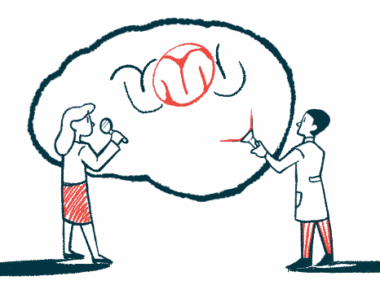Playing games can have many benefits for people with Parkinson’s
Games can be an important source of connection and mental stimulation
Written by |

“I accuse Colonel Mustard in the conservatory with a revolver.” Wait, does anyone have a conservatory in their home, and if so, what is it? Is colonel pronounced “col-o-nel” or with the letter “r”?
If any of the above rings a bell, then, like me, you grew up playing Clue, a murder mystery board game for older kids and families. Not only did I play the game as a child, but my own children also loved it. We played so often that we ran out of pages in the notepads that were provided and had to make homemade notebooks to track our accusations.
Now that I no longer play board games daily with young kids, I’ve graduated to playing games with my girlfriends and my husband, Arman, who has Parkinson’s disease.
Every Friday afternoon, I play a tile-based game called mahjong with my close group of girlfriends. My mother and grandmother also played it, and I love continuing the tradition. It’s a game of skill and luck, and I don’t win very often. My favorite part is spending time with friends, which is important for me as a caregiver. Plus, there’s the yummy lunches and desserts. (I’m so easy to please!)
Games with Arman
Arman and I enjoy playing the card game gin rummy in the evenings. We keep a tally of our wins and losses; he is currently in the lead. I purchased wooden cardholders to make gameplay easier for Arman, as his Parkinson’s symptoms make it challenging to hold and organize the cards.
As much as we enjoy taking a walk after dinner (exercise is an important tool in the fight against Parkinson’s), we also love playing games. Card and board games aren’t just a fun way to socialize; they can also provide various benefits, especially for older adults. It’s a win-win.
According to the Mayo Clinic News Network, “A Mayo Clinic study found that engaging in cognitive activities like reading books, playing games or crafting in middle age or later life are associated with a decreased risk of mild cognitive impairment.” This is especially important for Arman, as Parkinson’s is known to cause cognitive issues.
Mental health issues and loneliness can arise at any age, but they can be particularly challenging for older adults and anyone living with a chronic illness. Staying connected with friends and family is important, and engaging in activities like games with loved ones can provide both mental stimulation and socialization.
The benefits of gameplay aren’t limited to board and card games, though. According to an article published earlier this year on Parkinson’s News Today, “Playing rehabilitative video games along with physical therapy is more effective than conventional physical therapy only for managing symptoms of Parkinson’s disease, a study suggests.”
I was amazed that a video game could provide this type of result. This is an exciting development for the Parkinson’s community.
No matter the player’s age, games can provide countless benefits, from helping kids make special childhood memories to providing socialization and cognitive stimulation for adults. All this talk about games has me thinking about dusting off Clue for the next time my family is all together.
Happy gaming to all!
Note: Parkinson’s News Today is strictly a news and information website about the disease. It does not provide medical advice, diagnosis, or treatment. This content is not intended to be a substitute for professional medical advice, diagnosis, or treatment. Always seek the advice of your physician or another qualified health provider with any questions you may have regarding a medical condition. Never disregard professional medical advice or delay in seeking it because of something you have read on this website. The opinions expressed in this column are not those of Parkinson’s News Today or its parent company, Bionews, and are intended to spark discussion about issues pertaining to Parkinson’s disease.




Jana
I agree that games and toys provide a lot in our changing neurological world now.
I enjoy introducing more games to my husband (Parkinson's with Dementia). While he holds a PhD, is a scientist and author, who now he discounts all art, coloring, word puzzles, chess, most card games, and such (he's lost his writing skills), but he does enjoy the challenge of Chinese Checkers, dominoes, Bingo (he insists that he be the one who twirls the caged numbered balls). He works (small number of pieces) picture puzzles and a few more simple card games. The more tactile games provide decision-making, picking up and managing small pieces on a board with dexterity, and the more challenging goals of anticipating each move to win.
We have a "run" of plastic hurdles next to a lanai rail over which he lifts legs and feet for coordination. We enjoy raking leaves as an exercise game too and, of course walking. Stretchy rubbery tubes are good for upper body exercises that we make into games as well. He works out at a gym weekly with a trainer versed in weight training and neurological support. That's made a world of difference in cognition, balance, strength, muscle mass starting to return a bit, and a slight uptick in weight.
Back home, one toy that's good for his vocal strengthening and breath control is the Kazoo. He can feel the changes in vocal chords as he humms into the kazoo, low to high and high to low singing. His voice therapist had him humming into a straw, but the kazoo provided even more effective feedback to him. He practices "LOUD" with the kazoo too.
Yesterday, I got a Mustang model airplane kit. As a teenager, his bedroom was filled with planes hanging from the ceiling. This model kit has snap-on pieces that are for a younger - (or now older) - aviation enthusiast. He's not put it together but is interested in it.
Thank you, Jaimie, for your game article. I'd love to hear what others are introducing into the Parkinson's with Dementia world these days. No computer or digital games work anymore, and the TV remote is a challenge, so we're back to wooden boards with marbles and having some good old-fashion successes.
Jamie Askari
Hi Jana!! Thank you very much for these fabulous ideas; I know others will find them helpful, too. The kazoo is genius; I'm so glad that you mentioned it. Thank you for reading!
Claudia Tucci
Bananagrams is fun. It's like Scrabble but much quicker. Good for the brain and good for fine motor as there are tiles.
Jamie Askari
Hi Claudia, I love Bananagrams! I have it somewhere and will get it out to play this weekend. Thank you for the great suggestion!